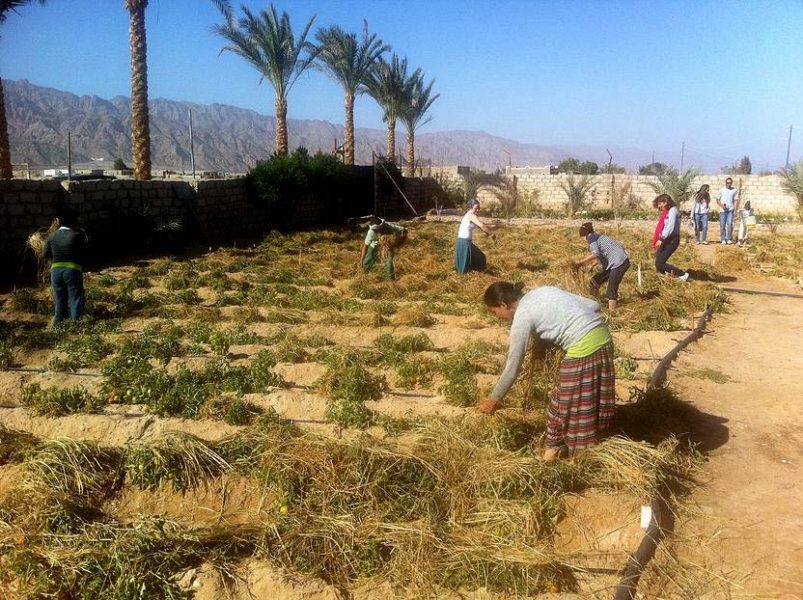We are pleased of welcoming Habiba Community (Sinai, Egypt) as new Med-O-Med member, within sustainable Development line and “Culture of Oasis” issue. It is very important to have members as Habiba Community who has proven that sustainable development is not only possible, but also the key for local communities’ welfare even in Desert areas.
In 1990, the whole South Sinai area mainly depended on mass tourism. This type of tourism was exploited by international agencies and the benefices obtained did not revert in the community welfare. The political and economic crisis, caused by the decrease of visitors in an area that had a high dependency on mass tourism, added to the lack of local development, affected extremely to the local population of Nuweiba.
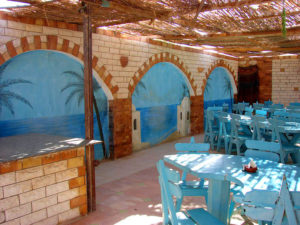 As a result, of this difficult situation Maged El-Said founded Habiba community in the center of Nuweiba City in 1994. He was concerned on the dependency on conventional tourism and the risk of non-having food sovereignty. He believed on the possibility of sustainable development combining organic agriculture with sharing cultural heritage as an asset for a non-conventional tourism integrated with local communities. This sustainable tourism concept compromised with local community involved responsible travellers, volunteers, and researchers interested in learning culture and/or reinforcing the locals’ well fare.
As a result, of this difficult situation Maged El-Said founded Habiba community in the center of Nuweiba City in 1994. He was concerned on the dependency on conventional tourism and the risk of non-having food sovereignty. He believed on the possibility of sustainable development combining organic agriculture with sharing cultural heritage as an asset for a non-conventional tourism integrated with local communities. This sustainable tourism concept compromised with local community involved responsible travellers, volunteers, and researchers interested in learning culture and/or reinforcing the locals’ well fare.
“There will be a time where we will have money, and no products to consume; humans won’t feed on banqenoute” El-Said said assuring the importance of the developmental initiatives.
Building up Majed El Said Dream
Maged El-Said initiated this pilot project taking advantage of his experience in tourism sector, the networks managed during his career in Sharm el Sheikh, and the relations established with the local population f Nuweuba City. The first step was the launching of Habiba Beach lodge in 1994.
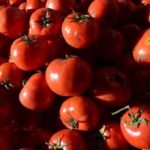 Thirteen years later, in 2007, he could establish Habiba Organic Farm introducing the know-how of innovative agriculture techniques, providing a real example of farming in the desert. Having the organic farm as a research and development hub, has helped experimenting all kinds of vegetables, fruits, and seeds in the desert climate as well as attracting researchers, academics and interested parties in developing the community. The locals have learnt which seeds can survive and produce in such a climate.
Thirteen years later, in 2007, he could establish Habiba Organic Farm introducing the know-how of innovative agriculture techniques, providing a real example of farming in the desert. Having the organic farm as a research and development hub, has helped experimenting all kinds of vegetables, fruits, and seeds in the desert climate as well as attracting researchers, academics and interested parties in developing the community. The locals have learnt which seeds can survive and produce in such a climate.
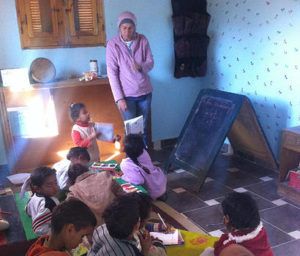 In order to raise awareness within the community and assure a sustainable future for the upcoming generation, Habiba Learning Centre (HLC) was built. The center offers applied education for the Nuweiba kids in granting them the opportunity to learn drawing, handcrafts, music and various activities. In addition, HLC provides different educational workshops in agriculture, sustainable earth-ship homes building, perm-culture, organic farming, and various artistic workshops.
In order to raise awareness within the community and assure a sustainable future for the upcoming generation, Habiba Learning Centre (HLC) was built. The center offers applied education for the Nuweiba kids in granting them the opportunity to learn drawing, handcrafts, music and various activities. In addition, HLC provides different educational workshops in agriculture, sustainable earth-ship homes building, perm-culture, organic farming, and various artistic workshops.
Habiba sustainable model
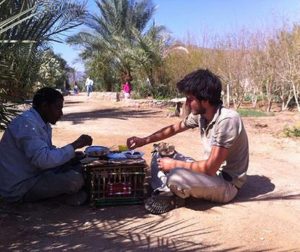 Habiba Community is concerned about promoting sustainability through building local communities. Advocating for agro tourism in rural areas and specifically Nuweiba which is done through the Organic farm, also enhancing the applied education methods for under privileged locals through a learning center and finally educating tourists and researches about the natural resources in Nuweiba through a beach lodge. The target market for each service introduced is different but the main category is the researchers, volunteers and agriculture and research institutions that are aiming to enhance sustainable development in local communities.
Habiba Community is concerned about promoting sustainability through building local communities. Advocating for agro tourism in rural areas and specifically Nuweiba which is done through the Organic farm, also enhancing the applied education methods for under privileged locals through a learning center and finally educating tourists and researches about the natural resources in Nuweiba through a beach lodge. The target market for each service introduced is different but the main category is the researchers, volunteers and agriculture and research institutions that are aiming to enhance sustainable development in local communities.
The growth plan is targeting a full profile of services that covers the basic needs for Bedouins in Nuweiba including food, education, organic farming, growing cattle and poultry. Habiba shall assist the Bedouins in taking over this profile to enhance their small businesses.
Within Habiba sustainable policy plan, it figures to limit the logistics and the supply chain to 100 km range in order to develop food sovereignty reinforcing distribution channels and local economy, and at the same time, being able to control the carbon emissions from fuel usage.
One of the keys of success of Habiba project has been to count with a diversified model able to take advantage of many synergies that revert on community welfare. Indeed, although the main economic income comes from the Beach lodge surplus, these visitors are involved in other components like the organic farm, and the research and learning centre. Therefore, the volunteers and researchers are a very important asset for Habiba Community, not only, for providing economic income, knowledge and exchanging of experiences, but, overall, for being the best ambassadors for keeping completing the cycle for a sustainable development.
Date Palm as an income
Within Habiba Organic farming actions, it is important to highline the social and strategic initiative of date palm farming that reflects the relevance of the palm as heritage value. Sinai Palm Foundation, created under the umbrella of Habiba project, aims to recover and stress the importance of the palm heritage in Sinai through its cultivation. Indeed, date palm farming not only preserves cultural and natural heritage, but also contributes to local sustainable development.
In this direction, the Sinai Palm Foundation carries out a collaborative methodology of crop sharing that involves the community, creating a workforce taking advantage of synergies. This methodology would create a synergy in the community creating a dynamic workforce. As a result, of the sharing of Palms, the community would obtain the 80% of the crops obtained, and would pay the 20% to the owner for the land use.
This process allows the production empowering women who would have an income. In addition, dates palms is a key product having great value in creating workforce since different parts can be used further in production of furniture and could be integrated in many industries.
Habiba as innovative research and learning center
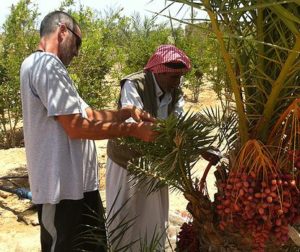 The main competitive advantage achieved in Habiba community, it is the know-how obtained building up a singular model. Indeed, Habiba is certified as an organic farm with organic products that are sold in Nuweiba with the technical know-how of agriculture in the dessert of Sinai in a salty soil by the sea. The main products obtained in Habiba organic farm are moringa, quinoa, onion, garlic, kale, pumpkin, tomato, bell pepper, eggplant, dates, olives, cherry tomato, pomegranate, corn, amomg others.
The main competitive advantage achieved in Habiba community, it is the know-how obtained building up a singular model. Indeed, Habiba is certified as an organic farm with organic products that are sold in Nuweiba with the technical know-how of agriculture in the dessert of Sinai in a salty soil by the sea. The main products obtained in Habiba organic farm are moringa, quinoa, onion, garlic, kale, pumpkin, tomato, bell pepper, eggplant, dates, olives, cherry tomato, pomegranate, corn, amomg others.
The development of this model has been possible through the partnership with the Dessert Research Centre, one of the largest Egyptian governmental institutions about agriculture and research. A team of specialized technicians and researchers that are advocating the same purpose in dessert areas participated in building up this model of organic farming under desert conditions. According to the memorandum of cooperation signed with the Dessert Research Center, Habiba Organic Farm is considered the research station in Nuweiba.
Finally, Habiba Community as well understood the importance of the education and knowledge exchange in building communities and their role in sustaining the developmental plans. This has helped in promoting the idea of having a learning centre in the city that would support the locals in experiencing exposure to different cultures and nationalities throughout different volunteering programs. This would also help in exchanging the knowledge and adding value for the kids in different fields through applied education.
Challenges and lessons learnt
The shift from the conventional tourism to sustainable development in South Sinai has faced many difficulties especially at the beginning of the project since the population was used to mass tourism as an easy and ongoing income during decades.
Although the instability motivated to understand the need for sustainable development, it was very difficult to find alternatives and shift to new solutions. Lack of awareness has been a great challenge and convincing the community with the value of agro-tourism needed lots of effort and dedication. Indeed, carrying out organic farms and responsible tourism initiatives needed awareness through conducting several seminars and sessions among the local population. This helped in transferring the value of producing less quantity but with certain products and techniques. After which, the introduction of the edu-tourism and the voluntarism took place and it was developed through awareness as well.
Habiba project impact in Nuweiba and perspectives
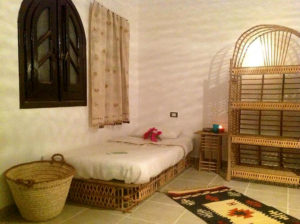 The impact of Habiba project in the area over the past 20 years has been, mainly, in advocating alternative ways of tourism and the knowledge acquired on organic farming with the collaborating of the Desert Research Centre. Indeed, Habiba has been an experimental farm that has built up a model that can be adapted for the local population. These experimental works has been a valuable feedback for developing know how techniques and improve their harvest.
The impact of Habiba project in the area over the past 20 years has been, mainly, in advocating alternative ways of tourism and the knowledge acquired on organic farming with the collaborating of the Desert Research Centre. Indeed, Habiba has been an experimental farm that has built up a model that can be adapted for the local population. These experimental works has been a valuable feedback for developing know how techniques and improve their harvest.
In addition, the learning Centre has contributed deeply for education and increasing welfare of local population. Indeed, the center beneficiaries were children, but the education actions have increased and addressed also to adults, especially women, taking into account the community demand.
Habiba project aim is to achieve self-sufficiency in an area of 100 km range decreasing the cost of transportation and reducing carbon emissions, and at the same time, well supply the local market with their needs. Finally, Habiba future prospects is to extend and transfer the experience for achieving sustainable development in Nuweiba area.
This post is available in: English Español

